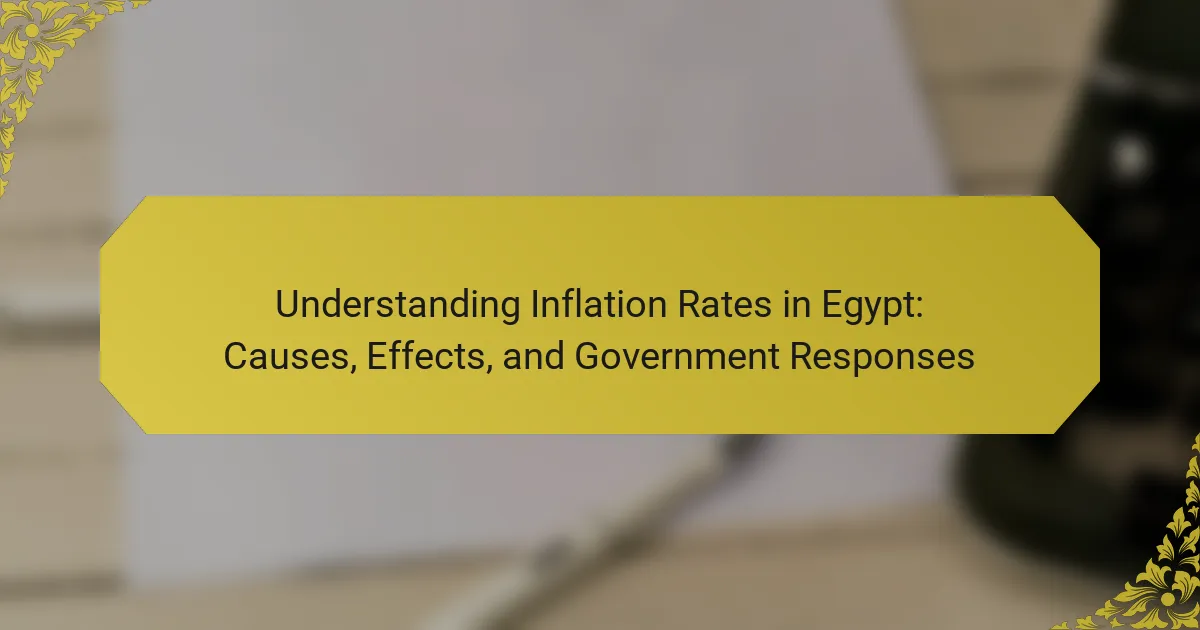
What are Inflation Rates and Why are They Important in Egypt?
Inflation rates measure the rate at which the general level of prices for goods and services rises. In Egypt, inflation rates are crucial for understanding the economic environment. High inflation can erode purchasing power, affecting consumers’ ability to buy essentials. It can also impact savings and investment decisions. For instance, Egypt’s inflation rate reached 15.3% in 2023, significantly influencing economic policies. The government monitors these rates to adjust monetary policy and stabilize the economy. Understanding inflation helps policymakers make informed decisions to protect economic stability.
How are inflation rates calculated in Egypt?
Inflation rates in Egypt are calculated using the Consumer Price Index (CPI). The Central Agency for Public Mobilization and Statistics (CAPMAS) conducts monthly surveys to gather data on prices of a basket of goods and services. This basket includes items such as food, clothing, housing, and transportation. CAPMAS then computes the percentage change in the CPI over time to determine inflation. For example, if the CPI increases from 100 to 105, the inflation rate is 5%. This method reflects the average price change experienced by consumers in Egypt. The CPI is a widely accepted measure for calculating inflation globally.
What factors influence the calculation of inflation rates?
The calculation of inflation rates is influenced by several key factors. These include the Consumer Price Index (CPI), which measures the average change in prices over time. Changes in demand and supply also play a significant role. When demand exceeds supply, prices tend to rise, leading to inflation. Conversely, when supply outstrips demand, prices may fall, resulting in deflation.
Monetary policy is another crucial factor. Central banks adjust interest rates to control money supply, impacting inflation. Fiscal policy, including government spending and taxation, can also affect inflation rates. External factors like global commodity prices and exchange rates further influence domestic inflation.
For instance, in Egypt, fluctuations in the price of imported goods can directly impact inflation calculations. Historical data shows that during periods of economic instability, inflation rates can spike due to these interconnected factors.
How do different economic indicators relate to inflation rates?
Different economic indicators significantly influence inflation rates. Key indicators include the Consumer Price Index (CPI) and Producer Price Index (PPI). CPI measures the average change over time in prices paid by consumers for goods and services. An increase in CPI typically signals rising inflation.
PPI reflects the average change in selling prices received by domestic producers. A rise in PPI often precedes increases in CPI, indicating future inflation. Employment rates also impact inflation. Higher employment can lead to increased consumer spending, driving prices up.
Monetary policy, influenced by interest rates, plays a crucial role. Lower interest rates generally stimulate borrowing and spending, contributing to inflation. Conversely, higher rates can reduce inflation by curbing spending.
Historical data supports these relationships. For instance, during periods of economic growth, such as the mid-2000s in Egypt, inflation rates rose alongside increased consumer spending and lower unemployment. Thus, understanding these indicators provides insight into inflation trends.
What are the main causes of inflation in Egypt?
The main causes of inflation in Egypt include rising food prices, currency devaluation, and increased production costs. Food prices have surged due to supply chain disruptions and global market fluctuations. The Egyptian pound has experienced significant devaluation, impacting import costs and overall purchasing power. Increased production costs stem from higher energy prices and raw material expenses. Additionally, government policies and fiscal deficits contribute to inflationary pressures. According to the Central Agency for Public Mobilization and Statistics, food inflation reached 21.5% in 2022, highlighting the severity of the issue.
How do supply chain disruptions impact inflation rates?
Supply chain disruptions lead to increased inflation rates by causing shortages of goods. When supply chains are disrupted, the availability of products decreases. This scarcity drives prices higher as demand outstrips supply. For example, the COVID-19 pandemic caused significant supply chain issues globally. As a result, essential goods became harder to find, leading to price hikes. Historical data shows that inflation rates surged in many countries during periods of supply chain instability. In Egypt, similar trends have been observed, particularly in food and consumer goods. These disruptions create a ripple effect, influencing overall economic stability and purchasing power.
What role does government policy play in inflation?
Government policy plays a significant role in inflation by influencing economic activity and price levels. Fiscal policy, through government spending and taxation, can stimulate or contract demand. For example, increased government spending can lead to higher demand for goods and services, potentially raising prices. Conversely, higher taxes can reduce disposable income, decreasing demand and potentially lowering inflation.
Monetary policy, managed by central banks, also impacts inflation. By adjusting interest rates, central banks can influence borrowing and spending. Lower interest rates encourage borrowing and spending, which can increase inflation. Conversely, higher rates can slow economic activity and reduce inflation.
In Egypt, government policies have directly affected inflation rates. For instance, in response to rising inflation, the Central Bank of Egypt raised interest rates in 2016. This action aimed to stabilize prices by curbing excessive demand. Additionally, government subsidies and price controls have been implemented to manage inflationary pressures on essential goods.
Overall, government policy is a crucial determinant of inflation dynamics in Egypt, impacting both demand-side and supply-side factors.
What effects does inflation have on the Egyptian economy?
Inflation negatively impacts the Egyptian economy by eroding purchasing power. When inflation rises, consumers can buy fewer goods and services. This leads to decreased consumer spending, which affects overall economic growth. High inflation also increases the cost of living, causing financial strain on households. Businesses face higher input costs, which can lead to reduced profit margins. As a result, companies may delay investments or lay off workers. The Egyptian pound’s depreciation against foreign currencies can further exacerbate inflationary pressures. Historical data shows that inflation rates in Egypt peaked at over 30% in 2017, significantly affecting economic stability.
How does inflation affect consumer purchasing power?
Inflation decreases consumer purchasing power. As prices rise, the same amount of money buys fewer goods and services. For example, if inflation is at 5%, a product that costs $100 last year now costs $105. This means consumers need more money to maintain their standard of living. According to the World Bank, high inflation can erode savings and increase the cost of living. In Egypt, inflation rates have fluctuated significantly, impacting household budgets. Increased inflation leads to reduced disposable income for consumers. This can result in decreased spending on non-essential items. Thus, inflation directly diminishes the value of money, affecting how much consumers can purchase.
What impact does inflation have on savings and investments?
Inflation erodes the purchasing power of savings and affects investment returns. As prices rise, the real value of money saved decreases. For example, if inflation is at 3% and savings earn only 1% interest, the actual purchasing power declines. This discourages saving, as individuals seek investments that outpace inflation. Investments in stocks or real estate may provide better protection against inflation. Historical data shows that equities often outperform inflation over the long term. Therefore, inflation necessitates strategic adjustments in savings and investment approaches to maintain value.
How does inflation affect different sectors in Egypt?
Inflation affects various sectors in Egypt by increasing costs and altering consumer behavior. The agricultural sector faces higher input costs, impacting food prices and farmers’ profits. The manufacturing sector experiences increased costs for raw materials, which may lead to higher product prices. The service sector sees a decline in consumer spending as inflation erodes purchasing power. The tourism sector may suffer as higher prices deter foreign visitors. Overall, inflation creates uncertainty, affecting investment decisions across all sectors. In 2023, Egypt reported an inflation rate of 21.9%, significantly influencing these economic dynamics.
Which sectors are most vulnerable to inflationary pressures?
The sectors most vulnerable to inflationary pressures include food, energy, and healthcare. Food prices often rise due to increased costs of production and transportation. Energy costs can spike from fluctuations in oil prices and geopolitical tensions. Healthcare expenses tend to increase as medical supplies and labor costs rise. These sectors are essential for daily living and are sensitive to price changes. Historical data shows that during inflationary periods, these sectors experience significant price increases compared to others. For instance, the World Bank reported that food inflation in Egypt reached 20% in 2022, highlighting the sector’s vulnerability.
How do businesses adapt to rising inflation?
Businesses adapt to rising inflation by adjusting pricing strategies and controlling costs. They may increase prices to maintain profit margins. This adjustment often reflects the rising costs of raw materials and labor. Businesses also seek to improve operational efficiency. Streamlining processes can help reduce expenses. Some businesses may shift suppliers to find more cost-effective options. Others invest in technology to automate tasks and lower labor costs. Additionally, businesses may revise their product offerings. They could focus on higher-margin products or services. Overall, these strategies are essential for maintaining financial stability during inflationary periods.

What are the government responses to inflation in Egypt?
The government of Egypt has implemented several measures to combat inflation. These include monetary policy adjustments, such as raising interest rates to curb spending. In 2022, the Central Bank of Egypt increased interest rates by 300 basis points to tackle inflationary pressures. Additionally, the government has introduced subsidies on essential goods to ease the financial burden on citizens.
Furthermore, Egypt launched initiatives to stabilize food prices, including increasing food supply through imports and local production support. The government also sought loans from international organizations to support its economic reforms. These actions aim to maintain economic stability and protect consumers from rising prices.
What policies has the Egyptian government implemented to control inflation?
The Egyptian government has implemented several policies to control inflation. These include monetary tightening through interest rate hikes. The Central Bank of Egypt raised interest rates multiple times to curb spending. Additionally, the government has implemented subsidy reforms on essential goods. These reforms aim to reduce fiscal pressure and stabilize prices. The government also engaged in currency stabilization measures. This includes managing the exchange rate to prevent excessive depreciation. Furthermore, the government has increased food production support. This initiative is designed to ensure a stable supply of basic commodities. These combined efforts aim to mitigate inflationary pressures in the economy.
How effective are price controls in managing inflation?
Price controls are generally ineffective in managing inflation. They can lead to shortages and decreased supply. When prices are set below market levels, demand often exceeds supply. For example, during Egypt’s 2011 revolution, price controls on basic goods led to widespread shortages. Additionally, price controls can distort market signals. This may result in reduced investment in production. Historical evidence suggests that countries with strict price controls often experience prolonged inflation. Therefore, while price controls aim to stabilize prices, they frequently produce adverse economic consequences.
What role do interest rates play in government strategies against inflation?
Interest rates are a crucial tool in government strategies against inflation. By adjusting interest rates, governments influence borrowing and spending in the economy. Higher interest rates typically reduce consumer and business borrowing. This leads to decreased spending, which can help lower inflation rates. Conversely, lower interest rates encourage borrowing and spending, potentially increasing inflation. Historical examples show that central banks, like the Federal Reserve, raise rates to combat inflation effectively. For instance, during the 1980s, the U.S. raised rates significantly to curb double-digit inflation. Thus, interest rates directly impact economic activity and inflation control strategies.
How does the government communicate inflation trends to the public?
The government communicates inflation trends to the public through official reports and press releases. These reports typically include data on the Consumer Price Index (CPI) and other economic indicators. The Central Agency for Public Mobilization and Statistics (CAPMAS) plays a key role in this process. CAPMAS regularly publishes statistical data on inflation rates. Additionally, government officials may hold press conferences to explain inflation trends. Media outlets also disseminate this information to a broader audience. Social media platforms are increasingly used for real-time updates. This multi-channel approach ensures that the public remains informed about inflation trends.
What tools does the government use to inform citizens about inflation rates?
The government uses various tools to inform citizens about inflation rates. These tools include official reports, statistical data releases, and public announcements. The Central Agency for Public Mobilization and Statistics (CAPMAS) publishes monthly inflation reports. These reports provide detailed information on price changes across various sectors. The government also utilizes press conferences to explain inflation trends and economic policies. Social media platforms are increasingly used to disseminate information quickly. Additionally, educational campaigns help citizens understand the implications of inflation. These communication methods ensure transparency and keep the public informed.
How does public perception of inflation affect government policy?
Public perception of inflation significantly influences government policy. When citizens believe inflation is high, they tend to demand government intervention. This can lead to policies aimed at controlling prices or increasing wages. Governments may implement fiscal measures to stimulate the economy. For instance, if inflation perceptions rise, authorities might adjust interest rates to stabilize prices. Historical examples show that public sentiment can prompt urgent policy changes. In Egypt, rising inflation perceptions led to government subsidies on essential goods. Thus, public perception shapes the urgency and nature of government responses to inflation.

What are the future outlooks for inflation in Egypt?
Future outlooks for inflation in Egypt indicate a potential increase in rates. The Central Bank of Egypt projects inflation to rise due to ongoing economic challenges. Factors such as currency depreciation and rising global commodity prices contribute to this trend. In September 2023, inflation reached 38.2%, reflecting significant pressure on consumer prices. Analysts expect these pressures to persist, influenced by fiscal policies and external economic conditions. The government is implementing measures to stabilize prices, but effectiveness remains uncertain. Continued monitoring of these factors is essential for accurate inflation forecasts.
What predictions do economists make about inflation trends in the coming years?
Economists predict that inflation rates in Egypt will remain high in the coming years. Factors such as currency depreciation and rising global commodity prices contribute to this expectation. The Central Bank of Egypt has indicated a target inflation rate of around 7% by the end of 2024. However, external shocks and domestic economic policies may influence actual outcomes. Historical data shows that inflation in Egypt has fluctuated significantly, with peaks reaching over 30% in recent years. Analysts expect inflation to stabilize but remain above historical averages. Predictions vary, with some economists suggesting a gradual decline, while others foresee persistent inflationary pressures.
How might global economic factors influence inflation in Egypt?
Global economic factors can significantly influence inflation in Egypt. Changes in global commodity prices directly affect local prices. For instance, fluctuations in oil prices impact transportation and production costs. Additionally, international supply chain disruptions can lead to shortages of goods in Egypt. This scarcity often drives prices higher. Currency exchange rates also play a crucial role. A weaker Egyptian pound against the dollar increases the cost of imported goods. Furthermore, global economic downturns can reduce foreign investment in Egypt. This reduction can limit economic growth and contribute to inflationary pressures. Overall, these interconnected factors highlight the vulnerability of Egypt’s economy to global economic trends.
What can individuals do to protect themselves from inflation?
Individuals can protect themselves from inflation by diversifying their investments. Investing in assets such as stocks, real estate, or commodities can help maintain purchasing power. Inflation often erodes the value of cash savings. Therefore, holding cash in high-yield savings accounts or inflation-linked bonds can mitigate losses. Additionally, individuals should consider adjusting their spending habits. Prioritizing essential purchases and reducing discretionary spending can help manage finances during inflationary periods. Historical data shows that inflation rates in Egypt have fluctuated significantly, impacting consumer prices. Adapting financial strategies in response to these changes is crucial for economic stability.
What strategies can consumers employ to mitigate the effects of inflation?
Consumers can mitigate the effects of inflation by adjusting their spending habits. They should prioritize essential purchases over non-essential items. Buying in bulk can reduce costs per unit, especially for non-perishable goods. Consumers can also seek discounts and use coupons to save money. Planning meals can minimize food waste and lower grocery bills. Additionally, they can explore alternative brands that offer similar quality at lower prices. Investing in fixed-rate loans can help shield against rising interest rates. Lastly, maintaining a budget helps track expenses and identify areas for savings.
How can businesses prepare for potential inflationary periods?
Businesses can prepare for potential inflationary periods by implementing various strategies. They should focus on cost management to maintain profitability. This includes negotiating better terms with suppliers to lower expenses. Diversifying product offerings can also help mitigate risks associated with inflation.
Additionally, businesses should build strong cash reserves. This prepares them to handle increased costs without compromising operations. Investing in technology can improve efficiency and reduce long-term costs. Monitoring economic indicators is crucial for anticipating inflation trends.
According to the International Monetary Fund, businesses that adapt quickly to economic changes are more resilient during inflationary periods. This proactive approach allows them to remain competitive and sustain growth.
The main entity of the article is inflation rates in Egypt, which are critical for understanding the country’s economic landscape. The article outlines the calculation of inflation rates using the Consumer Price Index (CPI), the factors influencing these rates, and the main causes of inflation, such as rising food prices and currency devaluation. It examines the effects of inflation on consumer purchasing power, savings, investments, and various economic sectors, while also discussing government responses and policies aimed at controlling inflation. Additionally, the article provides insights into future inflation trends and strategies for individuals and businesses to mitigate the impacts of inflation.


